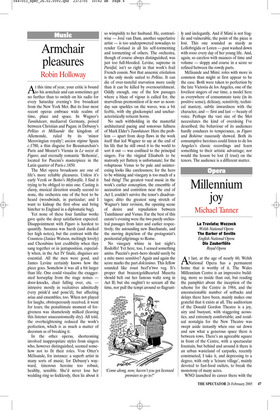Armchair pleasures
Robin Holloway
At this time of year, your critic is bound to his armchair and can sometimes get no further than to switch on his radio for every Saturday evening’s live broadcast from the New York Met. But its four most recent operas embrace wide realms of time, place and space. In Wagner’s Tannhkuser, mediaeval Germany, poised between Christian and Pagan; in Debussy’s Pelléas et Mélisande the kingdom of Allemonde, ruled by its ‘minor Merovingian royalty’; ancien régime Spain c.1780, a thin disguise for Beaumarchais’s Paris and Mozart’s Vienna in Le nozze di Figaro; and eternally romantic ‘Bohemia’, located for Puccini’s masterpiece in the Latin quarter of Paris c.1850.
The Met opera broadcasts are one of life’s more reliable pleasures. Unless it’s early Verdi or Boito’s Mefistofile, I find it trying to be obliged to miss one. Casting is classy, musical direction usually second to none, the orchestra one of the best to be heard (woodwinds, in particular; and I want to kidnap the first oboe and bring him/her to England in a diplomatic bag).
Yet none of these four familiar works gave quite the deep satisfaction expected. Disappointment with Figaro is hardest to quantify. Susanna was harsh (and ducked her high notes), but the contrast with the Countess (Janice Watson, meltingly lovely) and Cherubino lent credibility when they sang together or in juxtaposition, especially when, in the Act IV finale, disguises are essential. All the men were good, and James Levine certainly knows how the piece goes. Somehow it was all a bit larger than life. One could visualise the exaggerated horseplay from the stage noises door-knocks, chair falling over, etc. intrusive mostly in recitatives admittedly (very prink’d and ponc’d), but affecting arias and ensembles, too. When not played for laughs, obstreperously received, it went for tears; the penultimate moment of forgiveness was shamelessly milked (leaving this listener unaccustomedly dry). All told, the overheightening reduced the work’s perfection, which is as much a matter of decorum as of breaking it.
In the other operas, shortcoming involved inappropriate styles from singers who, however distinguished, seemed somehow not to fit their roles. Von Otter’s Mélisande, for instance: a superb artist in many sorts of music; for Debussy’s wayward, timorous heroine too robust, healthy, sensible. She’d never lose her wedding ring so fecklessly, then lie about it so wimpishly to her husband. He, contrariwise — José van Dam, another superlative artist — is too underpowered nowadays to render Golaud in all his self-tormenting and tormenting of others. The orchestra, though of course always distinguished, was just too full-blooded. Levine, supreme in Parsifal, isn’t so right in that work’s frail French cousin. Not that anaemic etiolation is the only mode suited to Pelléas. It can die of over-tasteful starvation more easily than it can be killed by overnourishment. Oddly enough, one of the few passages where a blaze of vigour is called for, the marvellous premonition of la mer as noonday sun sparkles on the waves, was a bit feeble, with shy glockenspiel and uncharacteristically reticent horns.
No such withholding in the masterful architectural pacing and sonorous fullness of Mark Elder’s Tannhkuser. Here the problem — apart from deep flaws in the work itself that led Wagner to say at the end of his life that he still owed it to the world to sort it out — was confined to the principal singers. For the virginal Elisabeth to be matronly yet fluttery is unfortunate; for the voluptuous Venus to be pale and uninteresting looks like carelessness; for the hero to be whining and vinegary is too much of a bad thing! The greatest vocal music in the work’s earlier conception, the ensemble of accusation and contrition near the end of Act I, couldn’t survive the tenor’s disadvantages; ditto the greatest sung stretch of Wagner’s later revision, the opening scene of desire and repudiation between Tannhäuser and Venus. Far the best of this curate’s evening were the two purely orchestral passages from later and earlier respectively; the astounding new Bacchanale, and the moving depiction of the protagonist’s penitential pilgrimage to Rome.
No vinegary whine in last night’s Rodolfo! Yet here, too, I sensed something amiss. Puccini’s poet–hero should surely be a mite more sensitive? Again and again the score marks the part dolcissimo. This fellow sounded like roast beef’n’two veg. It’s proper that brazen/goldhearted Musetta should belt out her famous waltz song in Act II; but she oughtn’t to scream all the time, nor pull the tempi around so flagrant ly and inelegantly. And if Mimi is not fragile and vulnerable, the point of the piece is lost. This one sounded as sturdy as Lollobrigida or Loren — past washed down with rosso every day of her young life. And, again, so careless with nuances of time and volume — sloppy and coarse in a score so refined between the rowdy parts.
Mélisande and Mimi: roles with more in common than might at first appear to be the case. Both were taken to perfection by the late Victoria de los Angeles, one of the loveliest singers of our time, a model here as everywhere of consummate taste (in its positive sense), delicacy, sensitivity, technical mastery, subtle inwardness with the character, and — first and last — beauty of voice. Perhaps the vast size of the Met necessitates the kind of overdoing I’ve described; the behaviour of its audiences hardly conduces to temperance, as Figaro and Bohème raucously showed. Both its consumptive heroines could listen to de los Angeles’s classic recordings and learn something to their artistic advantage; nor would the lesson be lost (I trust) on the tenors. The audience is a different matter.
















































 Previous page
Previous page